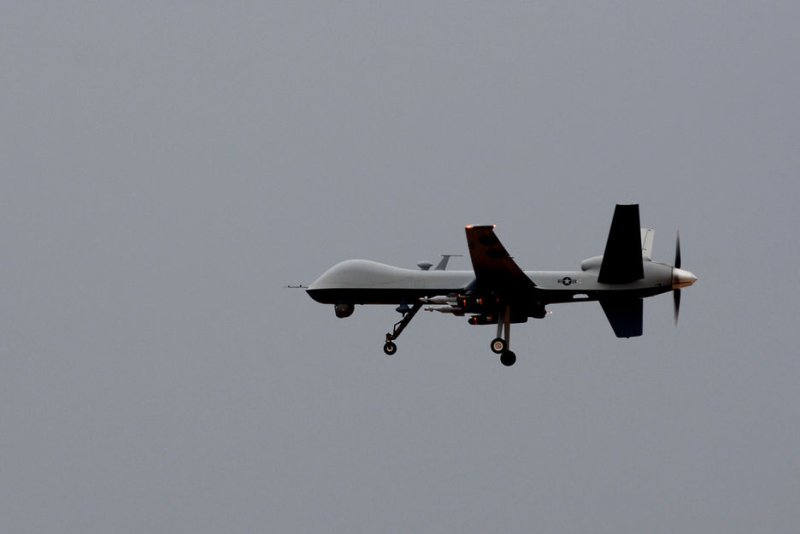An MQ-9 Reaper unmanned aerial vehicle. UPI/Erik Gudmundson/U.S. Air Force |
License Photo
ISLAMABAD, Oct. 31 (UPI) -- A drone strike, the first since Prime Minister Nawaz Sharif's recent U.S. visit, killed three suspected militants in Pakistan's tribal area, sources told Dawn.
The newspaper said the strike late Wednesday targeted a compound near Miramshah Bazaar in North Waziristan, and that three more people were injured.
The strikes come on the same day when the Pakistani government released a report on the number of civilian deaths that was sharply down from its earlier estimates.
The U.S. unmanned drone program has been described as a major irritant in the already strained U.S.-Pakistan relations. During his U.S. visit and his meeting with President Barack Obama last week, Prime Minister Sharif strongly urged for an end to the program as it is seen a violation of Pakistani's sovereignty and because of the toll of civilians.
However, the United States reportedly made no commitment to end the program, which has been quite effective in eliminating al-Qaida and other militants who are seen as using Pakistan's tribal areas as havens for launching attacks on U.S. and NATO forces across the border in Afghanistan.
Prior to Sharif's visit, Amnesty International, headquartered in Britain, had said in a report the drone program had resulted in civilian deaths and called for an end to program.
The Pakistani Defense Ministry Wednesday released a report saying there were 317 drone strikes in the past five year, which resulted in the deaths of 67 civilians, a number far lower that what had been reported earlier. The report also said the drone strikes of the past five years killed more than 2,000 suspected terrorists.
The government report also said there had been no civilian death in the drone strikes since January 2012, while more than 300 terrorists were targeted during that period, Dawn reported.
Dawn said the latest official data negated claims by local Pakistani political and religious parties that US drone strikes in Pakistan have mostly killed innocent civilians, including women and children.
Defense analyst Zahid Hussain told Dawn he believes the number of drone strikes in Pakistan may come down but it was not likely the United States would consider ending them.
A U.N. expert investigating the drone strikes had quoted the Pakistani government as telling him earlier this month that at least 400 civilians had been killed since they started in 2004.
The BBC said there was no explanation from the Pakistani government of the discrepancy in the current and previous estimates of civilian deaths.
An estimate provided to the BBC by the London's Bureau of Investigation, which researches Pakistan drone strikes, said there had been between 308 and 789 civilian deaths since Jan. 1, 2008.
The United States has said it takes "extraordinary care" to ensure the drone strikes comply with international law, the report said.
In an email to The New York Times, Ben Emmerson, the U.N. special rapporteur on human rights and counter-terrorism, said the latest figure of 67 civilian deaths estimated by the Pakistani Defense Ministry was "strikingly at odds" with the 400 civilian deaths given earlier by the Pakistan Foreign Ministry.
"It is essential that the government of Pakistan now clarify the true position," he said in the email, adding he would be writing to the government seeking clarification.
Amnesty International researcher Mustafa Qadri told the Times despite the discrepancy, the civilian casualties remain a serious problem and that the discrepancy only points both to the non-transparency of the drone program and Pakistani authorities' failure to investigate the drone strikes.
However, the report said investigating drone strikes in the lawless tribal areas of Pakistan is extremely difficult and a dangerous challenge.
In another twist to the issue, the Washington Post last week, citing CIA documents and Pakistani diplomatic memos, reported that Pakistani officials actually had secretly been endorsing the drone program for years, adding Pakistani officials even had routinely received classified briefings on the strikes and casualty counts. In the early stages of the campaign, the CIA even used Pakistani airstrips for its Predator fleet, the report said.















